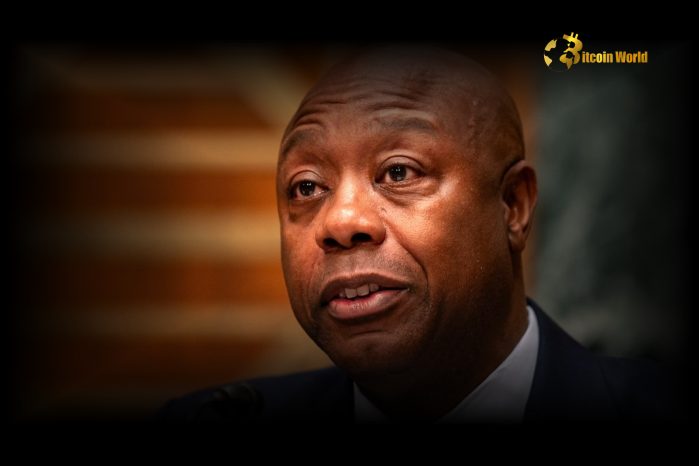U.S. Senator Tim Scott Focuses on Digital Asset Framework in 119th Congress
Senator Tim Scott has made the development of a regulatory framework for digital assets a priority in the 119th Congress, according to Fox Business reporter Eleanor Terrett. Scott’s agenda emphasizes consumer protection, education, and financial inclusivity, while encouraging innovation in digital asset technologies, including stablecoins.
This initiative positions the senator as a key advocate for clearer and more balanced regulations in the rapidly evolving cryptocurrency sector.
Key Objectives of Senator Scott’s Digital Asset Framework
1. Promoting Consumer Protection
- Regulatory Safeguards: The framework aims to implement measures to protect consumers from fraud and exploitation in the digital asset space.
- Transparency Requirements: Enhanced transparency for crypto projects and stablecoins to ensure accountability.
2. Driving Financial Inclusivity
- Broadening Access: Scott’s plan includes leveraging digital assets to provide financial services to underserved populations.
- Stablecoins for Payments: Emphasis on the role of stablecoins in enabling low-cost, cross-border transactions.
3. Encouraging Innovation
- Fostering Growth: The framework seeks to support U.S.-based innovation in blockchain and cryptocurrency technologies.
- Global Competitiveness: Clear regulations could strengthen the U.S.’s position as a leader in digital asset adoption.
4. Education and Awareness
- Public Understanding: Scott’s agenda emphasizes consumer education on the risks and opportunities of digital assets.
- Legislative Engagement: Collaboration with stakeholders, including private companies and academics, to shape effective policies.
Why This Matters for the Crypto Industry
1. Clearer Regulatory Environment
- Reduced Uncertainty: A well-defined framework can help crypto businesses navigate compliance requirements more effectively.
- Investor Confidence: Transparent regulations are likely to attract institutional investors and foster market stability.
2. Support for Stablecoins
- Payment Innovations: Stablecoins are central to Scott’s framework due to their potential to revolutionize payment systems.
- Regulated Growth: Oversight will ensure stablecoins are backed by adequate reserves and operate transparently.
3. U.S. Leadership in Digital Assets
- Setting Standards: By prioritizing digital asset regulations, the U.S. could establish itself as a global leader in the sector.
- Preventing Talent Exodus: Clear policies may prevent crypto innovation from migrating to other countries with more favorable regulatory environments.
Challenges Ahead for the Legislative Agenda
1. Bipartisan Collaboration
- Building Consensus: Gaining bipartisan support for digital asset regulations will be critical to passing legislation.
- Differing Priorities: Lawmakers may have varying perspectives on issues such as crypto taxation and stablecoin oversight.
2. Balancing Innovation and Oversight
- Avoiding Overregulation: Excessive restrictions could stifle innovation and push crypto businesses offshore.
- Consumer Risks: Striking a balance between fostering innovation and protecting consumers is a complex challenge.
3. Integration with Global Standards
- Harmonizing Policies: Ensuring U.S. regulations align with global frameworks will be key to fostering international collaboration.
Potential Impact of the Framework
| Area | Expected Impact |
|---|---|
| Consumer Protection | Improved safeguards and reduced fraud in the crypto space. |
| Financial Inclusivity | Broader access to financial services via stablecoins and blockchain. |
| Market Stability | Increased investor confidence through clear and enforceable regulations. |
| Innovation | Support for blockchain-based solutions and U.S. competitiveness. |
Conclusion
Senator Tim Scott’s focus on establishing a digital asset regulatory framework in the 119th Congress reflects a forward-thinking approach to the crypto industry. By prioritizing consumer protection, education, financial inclusivity, and innovation, the proposed framework has the potential to drive responsible growth in the digital asset sector while solidifying the U.S.’s leadership in blockchain technology.
As the legislative process unfolds, collaboration among lawmakers, regulators, and industry stakeholders will be crucial to creating balanced and effective policies.
To learn more about the innovative startups shaping the future of the crypto industry, explore our article on latest news, where we delve into the most promising ventures and their potential to disrupt traditional industries.
Disclaimer: The information provided is not trading advice, Bitcoinworld.co.in holds no liability for any investments made based on the information provided on this page. We strongly recommend independent research and/or consultation with a qualified professional before making any investment decisions.




